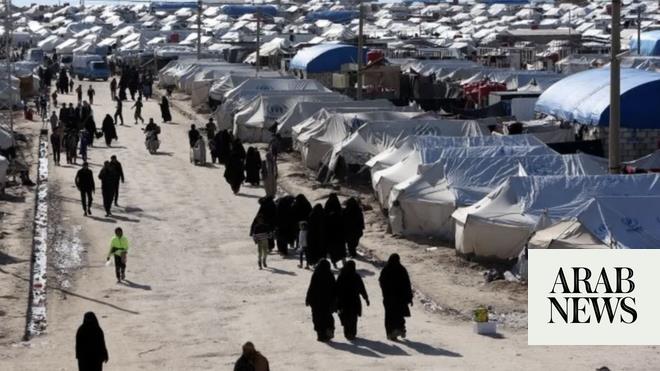
Researcher: ‘There are so many women fundraising to get out’
Several hundred European women, many of them wives of killed or imprisoned Daesh fighters, are being held camps
LONDON: So-called “Daesh brides” are receiving funding from supporters in Britain and other European countries to help them escape detention camps in Syria, an investigation by the Sunday Times has revealed.
Daesh sympathizers in the UK are using an international crowdfunding operation and encrypted messaging app to funnel money to people-smugglers in Syria as part of a concerted campaign to free women and children in the camps, the newspaper reported.
While thousands of inmates endure harsh conditions in the detention centers, some have access to mobile phones, which they use to plead for funding on social media in a bid to escape. The messages are then spread worldwide by Daesh supporters, including many in the UK.
One Muslim woman in northern England shared a post dozens of times asking for funds to free “sisters” in Syria.
Several hundred European women, many of them wives of killed or imprisoned Daesh fighters, are among those held in the camps.
These include dozens of British women and children, among them Shamima Begum, who left the UK aged 15 to become a Daesh bride and has since been stripped of her British citizenship.
Donations travel through an encrypted “cyberspace circuit” by way of intermediaries before ending up in the hands of Daesh women or smugglers helping them.
Would-be escapees mimic professional humanitarian campaigns to post testimonies on Facebook complaining of abuse, strip searches and inhumane camp conditions.
Testimonies are followed by a “how to help” guide, including account details on the encrypted Telegram messaging app.
Potential donors are encouraged to add the account. Once connected, they are invited to transfer whatever amount they can afford.
Funds are then transferred to a middleman who either passes it to a “broker” in the camp — who gives it to the women hoping to escape — or sends it directly to a smuggler in Idlib province.
Smugglers then bribe camp guards and organize transport to Idlib or another rebel-held part of Syria.
The women often have to change cars — and even smugglers — several times before reaching their destination.
This may help to explain the exorbitant going rate: Between $10,000 and $15,000 for a woman and three children.
“So if 10 people send $1,000 each, we will reach the goal. Or if 20 people give $500 each, we will reach it as well,” wrote one Facebook user, apparently a woman in one of the camps. “Free your sisters from the camps — spread the word.”
But relying on people smugglers can be risky. Some women complained on social media of being scammed.
A reporter who contacted several Telegram accounts was urged to transfer funds using the untraceable bitcoin cryptocurrency.
“It’s easy,” wrote the intermediary. “You buy the bitcoins and once you have them, you send them. This way the authorities have no proof against you.”
One donor recommended sending money via PayPal and labeling the transaction “something stupid like a birthday gift.”
Camp inmates from Europe regularly post pictures of handmade signs encouraging donations. They also publish photos of food that they say was bought with foreign help.
At least one British woman claimed to have been smuggled out of a camp. In a recent Facebook video, a woman calling herself Maryam Al-Britaniya begs followers to send donations.
Most of the Europeans, including British women and about 60 children, are held in two camps run by a Kurdish-led militia.
One of the camps, Roj, where Begum is held, is tightly guarded, but the other, Hol, is too big to police properly, guards say.
Few of the British women are thought to hold out much hope of being allowed to return home through legal channels.
While some inmates have been smuggled out, others are caught trying to flee. British sisters Salma and Zahra Halane — nicknamed the “terror twins” after dropping out of school near Manchester to join Daesh in 2014 — were intercepted by Kurdish-led forces while trying to escape the more heavily guarded Roj camp.
Successful escapes from Hol are more common. “You can bribe the guards there,” said a researcher who is in close contact with women in the camps. “There are so many women fundraising to get out.”
Some of those who escape make their way across the border to Turkey, and from there to other countries under false identities. “Some of them buy documents in Istanbul and go,” the researcher said.












